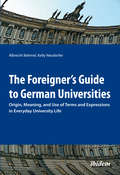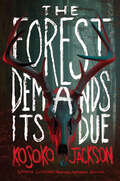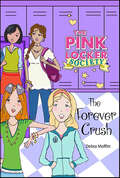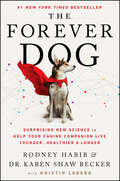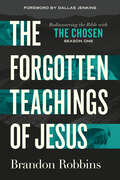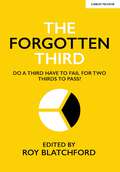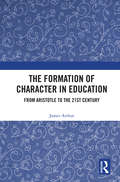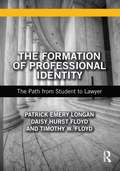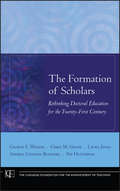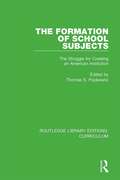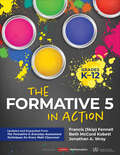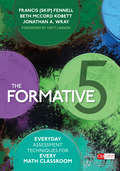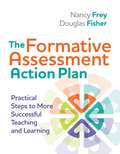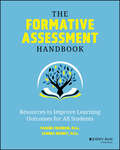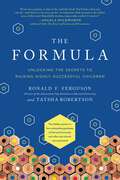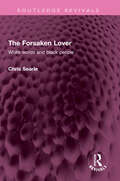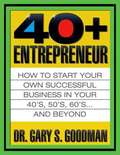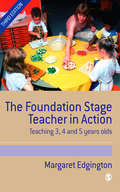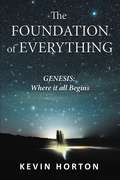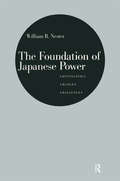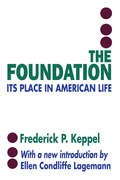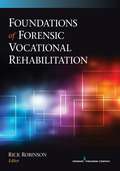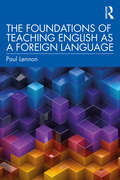- Table View
- List View
The Foreigner’s Guide to German Universities: Origin, Meaning, and Use of Terms and Expressions in Everyday University Life
by Albrecht Behmel Kelly NeudorferFiguring out the many new terms confronting international students at German-language universities can be difficult. Even if the degree program is in English, most administrative work has to be done in German, and the bureaucratic university jargon is a language in and of itself. This guide aims to help international students and researchers understand the structures and organization of German universities by providing in-depth descriptions of terms and their origins, allowing for easier integration into the host university and its culture.
The Forest Demands Its Due
by Kosoko JacksonA Lesson in Vengeance meets The Taking of Jake Livingston in this page-turning YA horror/fantasy set in dark academia about a queer Black teen who discovers the sinister history of his boarding school and the corrupt powers behind it all.Regent Academy has a long and storied history in Winslow, Vermont, as does the forest that surrounds it. The school is known for molding teens into leaders, but its history is far more nefarious. Seventeen-year-old Douglas Jones wants nothing to do with Regent's king-making; he’s just trying to survive. But then a student is murdered and, for some reason, by the next day no one remembers him having ever existed, except for Douglas and the groundskeeper's son, Everett Everley. In his determination to uncover the truth, Douglas awakens a horror hidden within the forest, unearthing secrets that have been buried for centuries. A vengeful creature wants blood as payment for a debt more than 300 years in the making—or it will swallow all of Winslow in darkness.And for the first time in his life, Douglas might have a chance to grasp the one thing he’s always felt was missing: power. But if he’s not careful, he will find out that power has a tendency to corrupt absolutely everything.A high-octane mystery of murder and magic for fans of Ace of Spades, House of Hollow, and Get Out!
The Forever Crush (Pink Locker Society Novels)
by Debra MoffittWhen the going gets tough, the tough get ... pink! Someone wants the Pink Locker Society gone, but Jemma and her BFFs are sticking together."Shut down the PLS - or else!" A mysterious someone keeps sending Jemma, Kate, and Piper threatening messages, but they won't stop the Pink Locker Society. They know the girls at their middle school need them. Who else will answer their questions about everything from bras to boys? And, the truth is, Jemma has just (secretly) submitted a question of her own. It's about Forrest, her forever crush. He asked her to be his pretend girlfriend and she said yes! Jemma promised to tell no one the truth about their relationship, but can she keep it from everyone, including her best friend, Kate? Not that Kate seems to have noticed - she's suddenly obsessed with whether people think she's fat. Beautiful Piper doesn't need to worry about that. She just wants to know if Forrest and Jemma have kissed. But does a real kiss with your pretend boyfriend still count?
The Forever Dog: Surprising New Science to Help Your Canine Companion Live Younger, Healthier, and Longer
by Rodney Habib Karen Shaw Becker#1 New York Times BestsellerIn this pathbreaking guide, two of the world’s most popular and trusted pet care advocates reveal new science to teach us how to delay aging and provide a long, happy, healthy life for our canine companions.Like their human counterparts, dogs have been getting sicker and dying prematurely over the past few decades. Why? Scientists are beginning to understand that the chronic diseases afflicting humans—cancer, obesity, diabetes, organ degeneration, and autoimmune disorders—also beset canines. As a result, our beloved companions are vexed with preventable health problems throughout much of their lives and suffer shorter life spans. Because our pets can’t make health and lifestyle decisions for themselves, it’s up to pet parents to make smart, science-backed choices for lasting vitality and health. The Forever Dog gives us the practical, proven tools to protect our loyal four-legged companions. Rodney Habib and Karen Becker, DVM, globetrotted (pre-pandemic) to galvanize the best wisdom from top geneticists, microbiologists, and longevity researchers; they also interviewed people whose dogs have lived into their 20s and even 30s. The result is this unprecedented and comprehensive guide, filled with surprising information, invaluable advice, and inspiring stories about dogs and the people who love them.The Forever Dog prescriptive plan focuses on diet and nutrition, movement, environmental exposures, and stress reduction, and can be tailored to the genetic predisposition of particular breeds or mixes. The authors discuss various types of food—including what the commercial manufacturers don’t want us to know—and offer recipes, easy solutions, and tips for making sure our dogs obtain the nutrients they need. Habib and Dr. Becker also explore how external factors we often don’t think about can greatly affect a dog’s overall health and wellbeing, from everyday insults to the body and its physiology, to the role our own lifestyles and our vets’ choices play. Indeed, the health equation works both ways and can travel “up the leash.”Medical breakthroughs have expanded our choices for canine health—if you know what they are. This definitive dog-care guide empowers us with the knowledge we need to make wise choices, and to keep our dogs healthy and happy for years to come.
The Forgotten Teachings of Jesus: Rediscovering the Bible with The Chosen: Season One
by Brandon RobbinsThe Chosen brings Jesus&’ teachings to the screen. Now bring additional understanding of His teachings to your life. A captivating exploration of New Testament living and traditions, this immersive book from one of the most popular commentators on the beloved television series takes readers on a spiritual journey to see Jesus and comprehend the Bible like never before. With over 100 million viewers since its debut, the award-winning television show The Chosen continues to captivate people around the world. In this spiritually profound book, Pastor Brandon Robbins explores the nuances of the first eight episodes of The Chosen to help us understand the heart of season 1: what it means to be a disciple of Jesus. In The Forgotten Teachings of Jesus, Brandon provides: An in-depth look at The Chosen&’s first season with four short, accessible chapters per episode Fascinating historical and cultural details to enhance your appreciation for the show and your understanding of the Bible Fresh perspective on favorite Bible stories and insight into how events on The Chosen connect with biblical truths Whether you&’re a devoted fan or simply curious about the series, The Forgotten Teachings of Jesus will enrich your understanding of The Chosen but most importantly ignite your desire to know Jesus more. With over 100 million viewers since its debut, the award-winning television show The Chosen continues to captivate people around the world. This immersive book from one of the most popular commentators on the beloved television series helps us see the show as well as the Bible with new eyes.
The Forgotten Third: Do One Third Have To Fail For Two Thirds To Succeed?
by Roy Blatchford'The Forgotten Third' is a provocative collection of essays which poses the fundamental question: 'Do a third of school students have to fail so that two-thirds can pass?'Roy Blatchford has brought together a group of leading thinkers and influencers in UK education to address this question - and pose some answers.Featuring contributions from: Caroline Barlow, Geoff Barton, Rebecca Boomer-Clark, Peter Collins, Tim Coulson, Kiran Gill, Miranda Green, Peter Hyman, David Laws, Rachel Macfarlane, Rupert Moreton, Harmer Parr, Marc Rowland, Catherine Sezen, Richard Sheriff, Nic Taylor-Mullins and Iain Veitch.'The Forgotten Third' challenges orthodoxies to shape a 'levelled up' education system.
The Formation of Character in Education: From Aristotle to the 21st Century
by James ArthurThe Formation of Character: From Aristotle to the 21st Century offers an introduction to the foundations, practices, policies and issues of character formation historically. Following a chronological order, it charts the idea of character formation in the Western tradition by critically examining its precursors, origins, development, meanings and uses. The book is based on the premise that current conditions and debates around character formation cannot be fully understood without knowledge of the historical background. It introduces many of the debates character formation has generated in order to offer different perspectives and possibilities and uses Aristotle as a lens to gain a better understanding of some of these positions, particularly the theoretical goals of character formation. Chapters explore character education from the classical period through the medieval, early modern, enlightenment and Victorian eras to 20th century influences, ending with a discussion of contemporary policies and themes relating to character education. This book will appeal to academics, researchers, and post-graduate students in the fields of character and virtue education as well as the history of education.
The Formation of Professional Identity: The Path from Student to Lawyer
by Patrick Emery Longan Daisy Hurst Floyd Timothy W. FloydBecoming a lawyer is about much more than acquiring knowledge and technique. As law students learn the law and acquire some basic skills, they are also inevitably forming a deep sense of themselves in their new roles as lawyers. That sense of self – the student’s nascent professional identity – needs to take a particular form if the students are to fulfil the public purposes of lawyers and find deep meaning and satisfaction in their work. In this book, Professors Patrick Longan, Daisy Floyd, and Timothy Floyd combine what they have learned in many years of teaching and research concerning the lawyer’s professional identity with lessons derived from legal ethics, moral psychology, and moral philosophy. They describe in depth the six virtues that every lawyer needs as part of his or her professional identity, and they explore both the obstacles to acquiring and deploying those virtues and strategies for overcoming those impediments. The result is a straightforward guide for law students on how to cultivate a professional identity that will allow them to make a meaningful difference in the lives of others and to flourish as individuals.
The Formation of Scholars
by Pat Hutchings George E. Walker Chris M. Golde Andrea Conklin Bueschel Laura JonesThis groundbreaking book explores the current state of doctoral education in the United States and offers a plan for increasing the effectiveness of doctoral education. Programs must grapple with questions of purpose. The authors examine practices and elements of doctoral programs and show how they can be made more powerful by relying on principles of progressive development, integration, and collaboration. They challenge the traditional apprenticeship model and offer an alternative in which students learn while apprenticing with several faculty members. The authors persuasively argue that creating intellectual community is essential for high-quality graduate education in every department. Knowledge-centered, multigenerational communities foster the development of new ideas and encourage intellectual risk taking.
The Formation of School Subjects: The Struggle for Creating an American Institution (Routledge Library Editions: Curriculum #25)
by Thomas S. PopkewitzOriginally published in 1987. This volume focuses upon the emergence of the subject-matter of the American school. This provides entrance to looking at the interplay between social, cultural, economic and professional interests that give form to contemporary school practices. The historical detail enables understanding of how school knowledge is shaped and fashioned by issues of structural continuity and social transformation. This selection of chapters looks at how practices have been shaped by the struggles to define the American school curriculum in different subjects. The authors bring out how particular social values are made into ideologies; and examine the past to enable consideration of the possibilities for further development.
The Formative 5 in Action, Grades K-12: Updated and Expanded From The Formative 5: Everyday Assessment Techniques for Every Math Classroom (Corwin Mathematics Series)
by Beth McCord Kobett Francis M. Fennell Jonathan A. WrayLeverage formative assessment in mathematics every single day For fans of the bestselling book The Formative 5: Everyday Assessment Techniques for Every Math Classroom comes this updated and expanded edition for understanding and implementing highly effective, research-backed formative assessment techniques into seamless, daily practice with students in grades K-12. The Formative 5 in Action serves as an interactive guide that steers teachers toward successful implementation of the formative five techniques of observation, interviews, Show Me, hinge questions, and exit tasks. This updated guidebook offers: More than 120 minutes of video examples of the five techniques in action in real K-12 classrooms, showing teachers not just what to do but how to do it An engaging format with built-in reflection exercises and activities that foster individual professional learning and promote PLC study through discussion and collaboration An explicit emphasis on providing effective and timely feedback to students while harnessing student strengths throughout teaching and learning Comprehensive responses to teachers’ frequently asked questions that have surfaced since the publication of the first book The research is clear – the authors’ five formative assessment techniques lead to greater attention to planning, stronger instruction for teachers, and better achievement for students. The Formative 5 in Action is a truly engaging resource that helps mathematics teachers and instructional leaders engage in classroom-based formative assessment with precision, intentionality, and ease.
The Formative 5 in Action, Grades K-12: Updated and Expanded From The Formative 5: Everyday Assessment Techniques for Every Math Classroom (Corwin Mathematics Series)
by Beth McCord Kobett Francis M. Fennell Jonathan A. WrayLeverage formative assessment in mathematics every single day For fans of the bestselling book The Formative 5: Everyday Assessment Techniques for Every Math Classroom comes this updated and expanded edition for understanding and implementing highly effective, research-backed formative assessment techniques into seamless, daily practice with students in grades K-12. The Formative 5 in Action serves as an interactive guide that steers teachers toward successful implementation of the formative five techniques of observation, interviews, Show Me, hinge questions, and exit tasks. This updated guidebook offers: More than 120 minutes of video examples of the five techniques in action in real K-12 classrooms, showing teachers not just what to do but how to do it An engaging format with built-in reflection exercises and activities that foster individual professional learning and promote PLC study through discussion and collaboration An explicit emphasis on providing effective and timely feedback to students while harnessing student strengths throughout teaching and learning Comprehensive responses to teachers’ frequently asked questions that have surfaced since the publication of the first book The research is clear – the authors’ five formative assessment techniques lead to greater attention to planning, stronger instruction for teachers, and better achievement for students. The Formative 5 in Action is a truly engaging resource that helps mathematics teachers and instructional leaders engage in classroom-based formative assessment with precision, intentionality, and ease.
The Formative 5: Everyday Assessment Techniques for Every Math Classroom (Corwin Mathematics Series)
by Francis Fennell Beth McCord Kobett Jon A. WrayMove the needle on math instruction with these 5 assessment techniques! Mathematics education experts Fennell, Kobett, and Wray offer five of the most impactful and proven formative assessment techniques you can implement—Observations, Interviews, “Show Me,” Hinge Questions, and Exit Tasks— every day. You’ll find that this palette of classroom-based techniques will truly assess learning and inform teaching. This book gives you a concise, research-based, classroom-dedicated plan with lots of tools to guide your daily use of The Formative 5. K-8 teachers will learn to Directly connect assessment to planning and teaching Engineer effective classroom questioning, discussions, and learning tasks Provide success criteria and feedback that moves students forward Includes a book study guide, samples, and a companion website with downloadables and multi-media examples.
The Formative 5: Everyday Assessment Techniques for Every Math Classroom (Corwin Mathematics Series)
by Francis Fennell Beth McCord Kobett Jon A. WrayMove the needle on math instruction with these 5 assessment techniques! Mathematics education experts Fennell, Kobett, and Wray offer five of the most impactful and proven formative assessment techniques you can implement—Observations, Interviews, “Show Me,” Hinge Questions, and Exit Tasks— every day. You’ll find that this palette of classroom-based techniques will truly assess learning and inform teaching. This book gives you a concise, research-based, classroom-dedicated plan with lots of tools to guide your daily use of The Formative 5. K-8 teachers will learn to Directly connect assessment to planning and teaching Engineer effective classroom questioning, discussions, and learning tasks Provide success criteria and feedback that moves students forward Includes a book study guide, samples, and a companion website with downloadables and multi-media examples.
The Formative Assessment Action Plan: Practical Steps to More Successful Teaching and Learning (Professional Development)
by Douglas Fisher Nancy FreyWinner of a 2012 Distinguished Achievement Award from the Association of Educational Publishers! Join Nancy Frey and Douglas Fisher as they outline a clear-cut, realistic, and rewarding approach to formative assessment. They explain how four discrete steps work in tandem to create a seamless, comprehensive formative assessment system one that has no beginning and no end. This ongoing approach enhances an active give-and-take relationship between teachers and students to promote learning. <p><p> Dozens of real-life scenarios demonstrate how to apply these steps in your classroom, always focusing on the presence or absence of student learning to guide the action. By enabling teachers and students alike to see more clearly what they need to do for learning to be successful, this approach builds students' competence, confidence, and understanding. <p><p> No matter what grade level you teach, The Formative Assessment Action Plan will help you make better use of assessment data so you can more quickly adjust instruction to keep every student on the path to success.
The Formative Assessment Handbook: Resources to Improve Learning Outcomes for All Students
by Marine Freibrun Sandy BrunetExplore the "why," "what," and "how" of formative assessments in the classroom In The Formative Assessment Handbook: Resources to Improve Learning Outcomes for All Students, the authors, with over 40 years of cumulative classroom, school, and district and state-level experience, deliver a crucial toolkit of ready-to-go ideas, activities, and reproducibles that make it easy to implement formative assessment quickly, effectively, and efficiently. You'll also learn what formative assessment is, what it looks like, and why it’s a critical component to student achievement. The authors explain how to set your classroom up for success and develop & select learning targets and success criteria to create a clear pathway and roadmap for your formative assessments. You’ll also find: Up-to-date research supporting the use of formative assessment in the classroom Instructions for properly utilizing pre-assessments Collaborative routines you can implement during instruction Discussions of dialogic teaching and dialectic synergy An indispensable resource for both new and veteran K-12 educators, The Formative Assessment Handbook will also prove invaluable to administrators and educational coaches.
The Formula: Unlocking the Secrets to Raising Highly Successful Children
by Tatsha Robertson Ronald F. FergusonWe all want our children to reach their fullest potential—to be smart and well adjusted, and to make a difference in the world. We wonder why, for some people, success seems to come so naturally. Could the secret be how they were parented? This book unveils how parenting helped shape some of the most fascinating people you will ever encounter, by doing things that almost any parent can do. You don't have to be wealthy or influential to ensure your child reaches their greatest potential. What you do need is commitment—and the strategies outlined in this book. In The Formula: Unlocking the Secrets to Raising Highly Successful Children, Harvard economist Ronald Ferguson, named in a New York Times profile as the foremost expert on the US educational "achievement gap," along with award-winning journalist Tatsha Robertson, reveal an intriguing blueprint for helping children from all types of backgrounds become successful adults. Informed by hundreds of interviews, the book includes never-before-published insights from the "How I was Parented Project" at Harvard University, which draws on the varying life experiences of 120 Harvard students. Ferguson and Robertson have isolated a pattern with eight roles of the "Master Parent" that make up the Formula: the Early Learning Partner, the Flight Engineer, the Fixer, the Revealer, the Philosopher, the Model, the Negotiator, and the GPS Navigational Voice. The Formula combines the latest scientific research on child development, learning, and brain growth and illustrates with life stories of extraordinary individuals—from the Harvard-educated Ghanian entrepreneur who, as the young child of a rural doctor, was welcomed in his father's secretive late-night political meetings; to the nation's youngest state-wide elected official, whose hardworking father taught him math and science during grueling days on the family farm in Kentucky; to the DREAMer immigration lawyer whose low-wage mother pawned her wedding ring to buy her academically outstanding child a special flute. The Formula reveals strategies on how you—regardless of race, class, or background—can help your children become the best they can be and shows ways to maximize their chances for happy and purposeful lives.
The Forsaken Lover: White words and black people (Routledge Revivals)
by Chris SearleFirst published in 1972, The Forsaken Lover draws upon Chris Searle’s experience as an English teacher in a secondary school in Tobago to focus upon the deep problems of identity encountered by black people having to use the white man’s language. He shows how the white man’s language is primarily interested in vindicating the white man’s pride and culture, and denying the black man his true autonomy. Black children are still being educated within a cultural context which denies them their own identity – in order to succeed they must become as white as possible. In the Forsaken Lover (the title comes from a poem written by a West Indian girl). Chris Seale presents a lively and direct account of his experience. The book is full of the children’s own writing – poetry, prose, drama – and, by referring to their words, Searle urges the need for change in policies and attitudes of language and education. The immediate context is Caribbean, but the issues are common to all societies where differences of colour, class and environment exist. The book will be of interest to students of race and ethnic relations, education, linguistics and public policy.
The Forty-Plus Entrepreneur: How to Start Your Own Successful Business In Your 40's , 50's, 60's...and Beyond
by Gary S. GoodmanAt age 90 Jack Smiley wasn't thrilled with the community in which he retired, so he built his own. Today it provides him with a net income of $40,000 each month. Famously, KFC's 65-year-old Kentucky Colonel Harlan Sanders supplemented a paltry Social Security check by franchising his unique recipe for fried poultry. Past 50, McDonald's Ray Kroc made a similar trek in multiplying by many thousands a few popular, golden-arched hamburger stands from San Bernardino, California. Contrary to popular mythology, entrepreneurship is not spearheaded mostly by baby-faced, technology-savvy postadolescents whose brands include Facebook and Apple. According to a recent study, fully 80 percent of allbusinesses are started up by people over 35. Amy Groth of Business Insider cites these reasons that fortune favors the old: First, older entrepreneurs have more life and work experience. In some cases they have decades of industry expertise - and a better understanding of what it truly takes to compete and succeed,in the business world. Second, they also have much broader and vaster networks. Even if older entrepreneurs are seeking to start businesses in entirely different industries, they have deep connections from all walks of life - for example, a brother-in-law could be the perfect COO. Third, those over 50 have acquired more wealth and better credit histories (which helps with securing loans) and are smarter with their finances. In this inspiring book from best-selling author Gary Goodman you'll discover: Supporters are everywhere: Your age cohort is the wealthiest! Now is the time to cash in your wisdom. Overcoming false beliefs and self-sabotage: why the only person holding you back is you. The Giraffe Syndrome: why the first step is the scariest. Busting age myths: "Nobody will work with me at my age!", "My best years are behind me", "It takes money to make money", and more.
The Foundation Stage Teacher in Action: Teaching 3, 4 and 5 year olds
by Ms Margaret Edgington`The book takes a deeper insight into the role of the practitioner and provides invaluable information' - Nursery Education `I think the book would be good value for money for anyone working within a foundation stage team' - Foundation Stage File `The Foundation Stage Teacher in Action is one of the definitive texts on the foundation stage, in which Margaret Edgington deals with the realities of practice based on theory and early years principles. It is immensely practical and easy to read, and while it deserves to be read from cover to cover, this New Edition is particularly accessible for those who want to dip in or who need to refer to a specific chapter' - Early Education `If you are new to the Foundation Stage, have been working in the Early Years for a few years, or for longer than you care to remember, if you have responsibility for employing staff for the Foundation Stage within your setting or if you work in a different key stage but have co-ordinator responsibility for the Foundation Stage, you should buy this book!' - National Campaign for Nursery Education Newsletter 'This is classic in the world of nursery education and this Third Edition, with its new title reflecting the changes in that world, is as exciting and challenging as earlier versions. Margaret Edgington's campaigning zeal is undiminished as she asserts the prime need for specialist teachers to work with young children in the Foundation Stage and backs this claim with authoritative research references. This is a strong, passionate authoritative text and I shall keep it close to hand for my own work' - Marian Whitehead, Nursery World `This is the third generation of books dealing with the pedagogy of the early years from Margaret Edgington, the first two being her editions of The Nursery Teacher in Action, originally published under the name Margaret Lally. The changes that have come about in early years education - notably the introduction of the Foundation Stage with its accompanying curriculum guidance and assessment requirements - meant that many early years books have needed updating. This Third Edition is more than an update; it represents some very hard thinking about what practitioners now need to know to be effective, and presents this by revisiting the original book's themes' - Escalate `Paul Chapman Publishing and Margaret Edgington have pulled off a real gem of a book, with updated sections (thank you for the Forest school stuff, for example!) and fresh insights. The hard work has really paid off - thanks so much' - Nick Swarbrick, Oxford Brookes University `This Third Edition brings a broader perspective to the early years world. Margaret's years of experience as a practitioner and consultant in the field are evident and she manages to blend good practice, policy and theoretical aspects, bringing an astute yet sensitive approach to the early years practitioners' varied experiences and qualifications. The book reaches not only those who are starting on their careers as early years practitioners, but also those who have been there a long time and witnessed many, often bewildering changes, where their beliefs and practice have been challenged. The new edition should be essential reading not only for those working in the field, whatever stage in their careers, but also for anyone who seeks to understand small children and support them in the best way possible' - Angela D Nurse, Head of Department of Childhood Studies, Canterbury Christ Church University This is a fully revised and updated edition of the author's best selling book The Nursery Teacher in Action, Second Edition. This book now includes an extended section on leadership, on managing the foundation stage and involving the team in monitoring and evaluating foundation stage practice. Curriculum, planning and assessment now reflect the new statutory guidance on the Foundation Stage Curriculum and Profile. The author reviews the implementation of the Foundation Stage and the Profile - positive developments and areas which are still proving challenging. New mate...
The Foundation of Everything: Genesis
by Kevin HortonDiscover a Solid Foundation for Everything The first pages of the Bible cause great turmoil in the minds of many well-educated people because the words of this book are contradicted by much of what we have been taught in twenty-first-century education. Geology teaches us that this world is billions of years old (deep time). Biology makes use of deep time to allow for the evolution of life. Evolution teaches that it is through death and struggle that life continuously improves and advances. In evolution, death is a vital selection mechanism in the removal of less evolved life forms. This death-selection mechanism is imagined as the means in which random changes in DNA is filtered to advance higher life forms. When one opens the Bible, you are given a totally different scenario. <P><P>Life was specially created on this earth and not very long ago. The creator of life is not death and struggle as Darwinian evolution teaches. Rather the Creator is an all-powerful intelligent Being. He willfully created the universe, the planet Earth, and all life therein. God imposed death upon all living creatures as a result of the original sin of the first humans and is a curse, not a creator. People of faith and those struggling to discover faith are challenged by this battle between science and the Bible. Many Christian believers have decided to consider the first pages of the Bible to be a myth and not to be taken literally. Who is to say, per this view, that God did not simply use evolution to bring about life? Yet when we stop and are honest with ourselves, this compromise causes an ever-present doubt about the validity of the Bible. After all, if it is not correct on the first page, dare we trust the rest of it? There is much more at stake. There exist issues, questions that people want to ask God, which cannot be answered if the first pages are simply myth. <P>In contrast, these questions are answered when the Bible is allowed to mean what it says; let me explain this further: when people of the twenty-first century approach the first three chapters of Genesis, they are tempted to explain away the clear meaning of the original Hebrew text in order to make the text fit into our cultural understanding of origins. But when we allow the Bible to speak for itself following standard rules of Hebrew grammar, it is amazing how much it addresses seminal questions of life. It is then that a person will build a solid foundation for a jubilant life of faith. The first pages of the Bible lay the foundation for all that follows. You might well say that the first pages of the Bible inform us of how everything came to be and forms the true foundation of everything!
The Foundation of Japanese Power: Continuities, Changes, Challenges
by William R. NesterRecent events in Tianamen Square have made such books abruptly important, though in some aspects outdated. This one examines reforms in higher education from before the republic to March 1988, and focuses on educational and economic relations with groups outside China, and the effect the reforms may
The Foundation: Its Place in American Life
by Frederich P. KeppelAs president of the Carnegie Corporation from 1922 to 1941, Frederick Keppel became a widely respected interpreter of philanthropic foundations. First published in 1930, The Foundation became one of his best-known works. As a brief, straightforward, and candid discussion of foundations and their activities, the volume was rightly praised.The book begins with a review of the history of foundations and then goes on to explain the then-current organization of the Rockefeller Foundation, the Carnegie Corporation, the Julius Rosenwald Fund, and a number of other trusts. It sets forth the purposes and procedures of different types of foundations - community foundations like the New York Community Trust as well as grantmaking foundations like the Commonwealth Fund. Comparing foundations to universities, the book argues that the most essential common purpose of the foundation is the furtherance of learning, culture, and research. It also calls on foundation executives to ""practice... the art of being well-informed"" and urges that informal advisory boards be relied on to provide specialized expertise.At the time Keppel became president of the Carnegie Corporation, the foundation was still a relatively new type of philanthropic organization. It is likely that Keppel had a significant impact on public attitudes toward these new kinds of organizations. His administrative style and his effort to find the money necessary to assist as many seekers as possible almost certainly helped remove the distance, mystery, and, in some quarters, the hostility that had surrounded foundations. He believed that foundations were accountable to the public, and he sought constructive criticism. Keppel's calls for openness and his service orientation undoubtedly helped define professional foundation practice. He understood what had to be accomplished if foundations were to gain an established place in American society and importantly contributed to the processes through which that was achieved. T
The Foundations Of Forensic Vocational Rehabilitation
by Rick RobinsonThis is the first fundamental text to focus specifically on forensic vocational rehabilitation, a field that is forecast to grow rapidly. Forensic vocational rehabilitation consultants evaluate the vocational and rehabilitation needs of individuals in an array of legal settings such as civil litigation, workersí compensation, Social Security disability, and others. The text is unique in its exploration of the vocational rehabilitation process from a biopsychosocial perspective that views disability as a complex and multidimensional construct. The book comprehensively describes the parameters and theoretical issues of relevance in evaluating and developing opinions in forensically oriented matters. It culls and synthesizes current peer-reviewed literature and research on this private subspecialty practice area of rehabilitation counseling, including theories, models, methods, procedures, and fundamental tenets of the field. Also included is current information about the labor market, life care planning, and professional identity, standards, and ethics.
The Foundations of Teaching English as a Foreign Language
by Paul LennonAn introductory textbook that assumes no prior knowledge of linguistics or second language acquisition, this book presents a comprehensive overview of the theoretical foundations, methods and practices of Teaching English as a Foreign Language (TEFL) for pre-service teachers. Lennon covers the theoretical bases for TEFL and addresses second language-acquisition research, past and present EFL teaching methodology, as well as psychological and social approaches to individual language-learner variation. Further chapters provide extensive yet accessible coverage on essential foundational topics, including chapters on pronunciation, grammar, vocabulary, literature and testing. Offering a sociocultural approach in which the teacher is seen as a facilitator and supporter of students’ self-directed learning, this text provides the prospective teacher with the knowledge and skills to be an effective educator in the EFL classroom. The targeted EFL focus makes this book ideal for pre-service teachers and for teacher training programmes around the world. Each chapter includes a Food for Thought section with questions for reflection and a Further Reading list.
